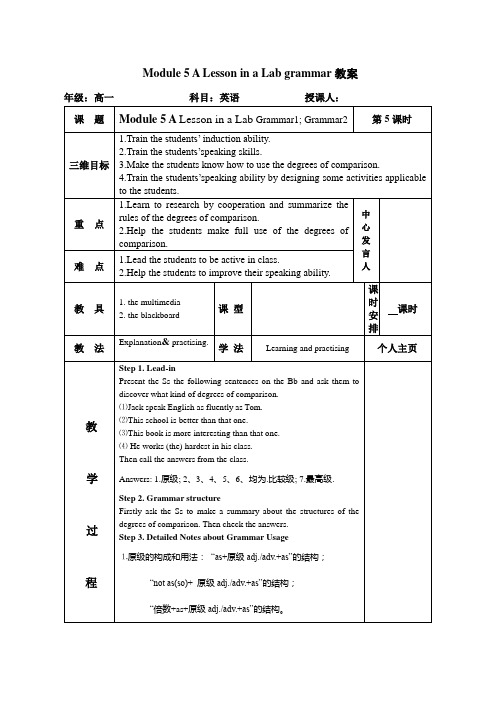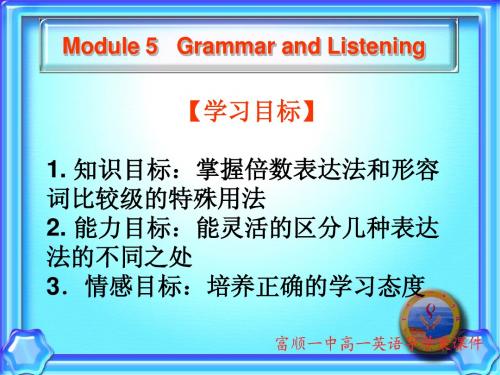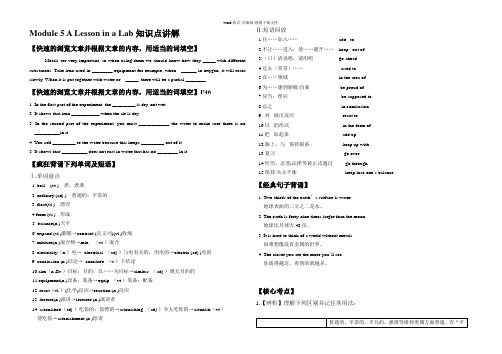Book 1 Module 5 A Lesson in a Lab 语法
外研版必修一Module 5 A Lesson in a Lab grammar教案

难点
1.Lead the students to be active in class.
2.Helpthe studentsto improve their speaking ability.
教具
1.the multimedia
2.the blackboard
课型
课时安排
课时
Байду номын сангаас教法
Explanation&practising.
Step 4. Practice
Step 5. Homework
1.Finish the exercises 2, 3 & 4 on page91-92 in their workbook.
2.Preview the rest of this module.
教后
反思
审核人签字:年月日
⑸被比较的双方必须具有可比性。
⑹连词than后使用代词主格和宾格有时意义不同。例如:
I know you better than he.我比他更了解你
⑺most前面加不定冠词a/an,或者不加冠词修饰形容词时,它的意思等于very。此时,most已失去最高级的意义。试比较:
a most interesting film(一部很有趣的电影) / the most interesting film(最有趣的电影)
Jack speak English as fluently as Tom.
This school is better than that one.
This book is more interesting than that one.
He works (the) hardest in his class.
外研版高中英语必修一 Module 5 A lesson in a Lab

外研版高中英语必修一Module 5 A lesson in a LabModule 5 A Lesson in a Lab【教学目标】1.学生通过学习,能够基于日常科学实验写出一份报告2.能够掌握本模块的重点词汇、语法及日常交际语【知识梳理】重点短语1.be proud of·基本用法be proud of... 为...感到骄傲/自豪=take pride inI am proud of knowing him.我为认识他而感到自豪。
He was proud of/took a great pride in being a member of the club.他以身为那个俱乐部的会员而深感自豪。
·知识拓展--相关短语1. be proud to do sth. 因做某事而感到自豪。
I am very proud to call you my friend.能够和你以朋友相称,我感到自豪。
2. be proud that... 以...为荣He felt proud that he was elected chairman.他以当选主席为荣。
ed to·基本用法used to 过去常常…,强调与现在的对比。
I used to live in London.我过去一直住在伦敦。
He used to smoke a pack of cigarette a day.他过去经常一天抽一包香烟。
注意:used to... 的否定句常用didn't use to 或used not to (usedn't to);疑问句常用e to...? 有时也用used...to....? 如:He didn't use to drink. = He usedn't to drink.他以前不喝酒。
Did you use to be a teacher?你以前是老板吗?·知识拓展--词义辨析:used to do sth/ be(get) used to(doing) sth. / be used to do sth. /be used for (doing)sth.1. used to do 表示过去常常...We used to sing songs together.我们过去常常一起唱歌。
外研版 Book 1 Module 5 A Lesson in a Lab 教案

Module 5 A Lesson in a Lab Ⅰ. 模块教学目标Ⅱ. 目标语言Ⅲ.教材分析与教材重组1. 教材分析本模块以“A Lesson in a Lab”为话题,旨在通过模块教学,使学生了解一些基本的科学实验知识,学会怎样写实验报告,并掌握一些相关的词汇与短语,激发学生对科学的兴趣。
此外还要求学生学会读一些大的整数、分数及小数。
从文化的角度来看,鼓励学生了解国外相关科学教学的情况,以扩大学生的知识面,从而激发他们的学习兴趣。
1.1 INTRODUCTION 这部分由三个内容组成。
通过听材料,归纳词语和回答问题这三个形式来完成本部分所涉及到的与科学、实验相关的词语的练习,为以后的各项活动做好准备。
1.2 VOCABULARY AND SPEAKING 这部分设计了一些数字,包括整数、分数和百分数,并通过一些练习让学生熟悉并准确使用英语数字的读法。
1.3 GRAMMAR 1 这部分介绍了形容词比较级中相关倍数的两种主要用法:... times ... than ...和... times as ... as ..., 并通过对比练习来增强学生对这个用法的了解。
1.4 READING AND VOCABULARY 这部分由两篇短文组成。
Passage A 介绍了金属在生活中的重要性,并列举了一些金属在氧气、水及蒸气中的反应及其结果。
Passage B 介绍了A Simple Scientific Experiment,要求学生学习如何描述或写一个科学实验报告。
通过对这两篇文章的学习,学生还能够学会一些科学词汇,有助于今后阅读一些相关的文章。
1.5 VOCABULARY 该部分介绍了带分数的读法,及一些实验仪器的词汇,并配有相关练习。
1.6 LISTENING AND WRITING 这部分听力的内容是实验中的师生对话。
我们能够将此作为对阅读内容在语言技能上的补充。
听力问题的设计本身已经显示了做听力练习的技巧。
Book 1 Module 5 A Lesson in a Lab知识点

沾化二中高一课时学案学科:英语姓名:班级:组别:使用时间:2013年10月日编号:课题Module 5 A Lesson in a LabLanguage points 编制人王英审核人高一英语组学习目标1. Words to learn : aim react conclusion2. Phrases to memorize: add… to…keep…out of…3. sentences to master: 1)The closer you are, the more you’ll see.2)Two-thirds of the earth’s surface is water.目标达成通过合作探究完成目标1,2,3课前自主学习探究学生纠错1)收缩vi __________ 反义词________________合同n. ___________2)反应vi_____________反应n.______________3)混合物n.________________混合vt. ______________混合的adj.________________4)电n.______________用电的adj._______________5)结论n._________________下结论,推断vt.____________课中探究学生纠错一.单词点击1.aim. n. ___________搭配:with the aim of 为了…/ 目的是…take aim at…瞄准…v. 试图/意欲/旨在; 瞄准/对准[拓展] aim to do …意欲做…/ 打算做……aim at sth/doing sth 目标是…/ 打算做...be aimed at sb 针对某人/适宜某人be aimed at sth 旨在…/目的在于…做一做:1). He studies hard,________________(为了) passing the exam.2). What I said _______________________.我说的那些话不是针对你。
Book 1 Module 5 A Lesson in a Lab 1-5-3课件定稿

Module 5 Grammar and Listening
探究点 翻译 The plane is flying higher and higher. She is more and more careful. The more careful you are, the better you will do in the exam. The darker it was, the more frightened she felt. The weather couldn’t be worse. I can’t agree with you more. China is larger than any of the other countries in Asia. She gets up earlier than any other girl in her class every day. This question is a little easier than that one. The situation is even more difficult than before.
Module 5 Grammar and Listening
【课堂训练】
1-6 ACDBBB
Module 5 Grammar -6
DBCDBD
Module 5 Grammar and Listening
2 Task 1 写出下列单词的比较级(略) Task 2 翻译句子
He runs faster than me. The scenery of this city is more beautiful than that one. The wind is getting stronger and stronger.
BOOK1 Module 5 A Lesson in a Lab (教案)

BOOK1 Module 5 A Lesson in a LabReading & VocabularyTeaching aims and demands:⒈To learn about some vocabulary and knowledge related to science and experiments⒉To know about some metals and get to know their main uses in our lives⒊To make the students know how to do a simple experiment and write the report about it inEnglish4. To develop students’expression ability as well as reading ability by practicing these twopassages5 To raise students’ interests in science and form the scientific attitude.Teaching key points:⒈To make the students understand and grasp the vocabulary and knowledge related to science and experiments⒉To enable the students to know how to read some passages about simple scientific experiments Teaching difficulties:To make students learn how to write an experiment report in EnglishTeaching methods:⒈Communicative Approach⒉Task-based Approach⒊Aural-oral Approach with the help of the multi-media computer and the recorderTeaching aids:Multi-media computer; Software; PowerPoint; RecorderTeaching procedures:Step 1:Lead-inAt first show the students the picture of a lab with the help of computerThen design the following questions and ask the students to discuss them in groups:1.Are you interested in doing scientific experiments?2.Suppose you want to do a chemical experiment about some metals, do you think it is necessary to know about how they react with other substances?3.In order to do an experiment successfully, what should you prepare for it?This step is to warm up the students and raise their interests to speak English in class. Because all these questions are very close to the students’ daily life and studyingStep 2:Pre-readingTeacher: Since you are interested in doing scientific experiments, now let’s get to know some vocabulary and knowledge related to science and experiments.At the same time I can type out some pictures about some metals on the screen with the help of the computer as follows:⑴potassium(钾) ⑵sodium(钠) ⑶calcium(钙) ⑷magnesium(镁)⑸aluminium(铝) ⑹zinc(锌) ⑺iron(铁) ⑻copper(铜)As we match each of the above pictures with the new words, I can ask the students like this: What’s this? And what can it be used for?At this moment the students’ interests are probably approaching a climax. So I further ask them like this: Do you want to know more about these metals? And do you know how we can usethese metals better? Well, this is what we’ll study very soon.This step is employed to create a language environment for students’communication and arouse their interests in reading passage A and passage B on page 44-45Step 3: Re adingPassage AT: Well, let’s read through passage A with the tape of it very quickly to try to catch its main idea. Then finish Activity 2 on page 44 and give your reasons.Next, ask the Ss to read passage A very carefully to find out the answersPassage BT: Well, from passage A we can see how interesting the experiment about the reaction of metals is! But do you know how we can do a chemical experiment in a lab successfully? And what is the correct order to describe a scientific experiment?T: Now, let’s come to see “ A simple scientific experiment”!Then play the tape of passage B for the students and ask them to read the passage with the tape quickly and finish Activity 4 on page 45.In order to lead the students to read the text very carefully, the following task-based questions can be signed to ask them to answer:⑴Can you guess the meaning of the word “apparatus” through the context? Have you known all of the apparatuses of this experiment?⑵In the second part of the experiment, why must you boil the water? And then why do you add some oil to the water?Then in order to make the Ss consolidate what they read in passage B and check if they have understood the experiment very well, Activity 5 on page 46 can be typed out on the screen with the help of computer as a task-based activity。
必修一Module-5-A-Lesson-in-a-Lab知识点讲解及检测

Module 5 A Lesson in a Lab知识点讲解【快速的浏览文章并根据文章的内容,用适当的词填空】Metals are very important, so when using them we should know how they _____ with different substances. Take iron used in ________ equipment for example, when ______ in oxygen, it will react slowly. When it is put together with water or _____, there will be a partial ________.【快速的浏览文章并根据文章的内容,用适当的词填空】P461. In the first part of the experiment, the _________ is dry, not wet.2. It shows that iron ___________ when the air is dry.3. In the second part of the experiment, you must ____________ the water to make sure there is no __________in it.4. You add _________ to the water because this keeps _________ out of it.5. It shows that __________ does not rust in water that has no ________ in it.【疯狂背诵下列单词及短语】Ⅰ.单词盘点1. boil (vt.) 煮;煮沸2. ordinary (adj.) 普通的;平常的3. float(vi.) 漂浮4.form (vi.) 形成5. balance(n.)天平6. expand (vi.)膨胀→contract (反义词)(vi.)收缩7. mixture(n.)混合物→mix (vt.)混合8. electricity(n.)电→electrical (adj.)与电有关的;用电的→electric (adj.)电的9. conclusion (n.)结论→conclude (v.)下结论10.aim(n.&v.)目标;目的;以……为目标→aimless (adj.)漫无目的的11.equipment(n.)设备;装备→equip (vt.)装备;配备12. react(vi.)(化学)反应→reaction (n.)反应13. lecture(n.)演讲→lecturer (n.)演讲者14. astonished(adj.)吃惊的;惊愕的→astonishing (adj.)令人吃惊的→astonish(vt.)使吃惊→astonishment (n.)惊奇Ⅱ.短语回放1.往……加入……add...to...2.不让……进入;使……避开……keep...out of...3.(口)请说吧;请用吧go ahead4.过去(常常)……used to5.在……领域in the area of6.为……感到骄傲/自豪be proud of7.应当;理应be supposed to8.总之in conclusion9. 对...做出反应react to10.以...的形式in the form of11.把...加起来add up12.跟上;与...保持联系keep up with13.复习go over14.经历,忍受;法律等被正式通过go through15.保持/失去平衡keep/lose one’s balance 【经典句子背诵】1. Two-thirds of the earth’s surface is water.地球表面的三分之二是水。
必修一module 5A Lesson in a lab知识点讲解及练习

MODULE 5 A Lesson in a labI 重点单词________ 液体________ 膨胀________ 收缩________ 物质________ 混合物________ 煮;煮沸________ 普通的,平常的________ 结论________ 形成________ 溶解;分解;分离________ 天平________ (化学)反应________ 钾________ 钠________ 钙________ 镁________ 铝________ 锌________ 部分的;局部的________ 铜________ 氧化物________ 氧气________ 电________ 蒸汽,水汽________ 漂浮________ 反应________ 有关电的;用电的________ 设备,装备________ 夹子;小镊子________ 火焰________ 设备,工具________ 演讲________ (大学的)科,系________ 吃惊的,惊愕的II 重点词组________ 过去常常做某事________ 在最后二十年________ 以…自豪________ 应该做某事________ 被期望做某事________ 和…不同________ 遗漏,省略,忽略________ 和…一样________ 想起,认为________ 让…按次序排列________ 确保________ 至少________ 向…学习________ 把…加在…上________ 阻止Section I Introduction , vocabulary and speaking语言知识点精讲Steel is a mixture of iron and other substances. 钢是铁和其他物质的混合物l)句中的substance 意为’_______ ”,是________ 名词________________________ ?它是由什么物质组成的?_________________________盐是我们烹任时用的东西。
- 1、下载文档前请自行甄别文档内容的完整性,平台不提供额外的编辑、内容补充、找答案等附加服务。
- 2、"仅部分预览"的文档,不可在线预览部分如存在完整性等问题,可反馈申请退款(可完整预览的文档不适用该条件!)。
- 3、如文档侵犯您的权益,请联系客服反馈,我们会尽快为您处理(人工客服工作时间:9:00-18:30)。
沾化二中高一课时学案学科:英语姓名:班级:组别:使用时间:13年10月日编号:课题Module 5 A Lesson in a LabGrammar 编制人王英审核人高一英语组学习目标1.理解形容词和副词等级的含义2.学习形容词和副词的比较级,并能熟悉的应用于做题中。
目标达成1.通过课前自主学习达成目标12.通过合作探究完成目标2课前自主学习学生纠错翻译下列句子1.这间房是那间的三倍大。
2.这房间不如那房间漂亮。
3.明天请早点来。
4.他工作越是努力,他就越感到幸福。
5.天气越来越冷了.6.他和他哥哥一样高。
7.这条河比那条长很多。
8.他比以前学习更刻苦努力了。
9.The earth is twice as large as the moon.10.I’m becoming more and more interested in physics.课堂探究教师点拨(一)形容词和副词的比较等级1. 原级的用法。
用法:表示双方在程度、性质、特征等某方面相等时,用“a s + 原级形容词/副词+ as”的结构;表示双方不相等时,用“not so(as) + 原级形容词/副词+ as”的结构;表示一方是另一方的若干倍时,用“倍数+ as + 原级形容词/副词+ as”的结构。
如:Xiao Wang is as tall as Xiao Yu. 小王和小于一样高。
This building looks not so (as) high as that one.这座大楼看起来了不如那座高。
Miss Xu speaks English as fluently as you.许老师将英语和你一样流利。
This room is three times as large as that one. 这间房是那间的三倍大。
2.比较级的构成和用法掌握比较级的变化规则,熟记少数不符合规则的特殊形容词和副词。
比较级的用法:(1)对方比较,表示一方超过另一方时,用“比较级+than”的结构表示。
This picture is more beautiful than that one.这幅画比那幅漂亮得多。
(2)表示一方不及另一方时,用“less +原级+than”的结构表示。
This room is less beautiful than that one.这房间不如那房间漂亮。
(3)表示一方超过另一方的程度或数量时,可在比较级前加表示程度的状语,如even, a lot, a bit, a little, still, much, far, yet, by far等修饰。
He works even harder than before. 他比以前学习更刻苦了。
注意:英语的比较级前如无even, still或yet等时,译成汉语时可用“较”或“……一些”或不译出,一般不译成“更”。
She is better than she was yesterday. 她比昨天好多了。
Please come earlier tomorrow. 明天请早点来。
注意:by far通常用于强调最高级。
用于比较级时,一般放在比较级的后面,如在前面,应在二者中间加“the”。
He is taller by far than his brother. 他比他兄弟高得多。
He is by far the taller of the two brothers. 他在两兄弟中绝对是高的。
课堂探究教师点拨(4)表示一方随另一方的程度而变化时,用“the +比较级(主语+谓语),the +比较级(主语+谓语)”的结构(意为“越……越……”)。
The harder he works, the happier he feels.他工作越是努力,他就越感到幸福。
(5)不与其他事物相比,表示本身程度的改变时,用“比较级+and+比较级”的结构。
The weather is getting colder and colder. 天气越来越冷了。
The girl becomes more and more beautiful. 这姑娘越来越漂亮了。
(6)某些以-ior结尾的形容词进行比较时,用to代替than。
这些词有inferior(劣等的,次的), superior(较好的,优于……),junior(资历较浅的), senior(资格较老的), prior(在……之前)等。
He is superior to Mr. Zhang in chemistry.他在化学方面高于张老师。
(7)在比较从句中为了避免重复,我们通常用that(those)、one(ones)代替前面出现的名词。
that指物,one既可指人又可指物。
that可代替可数名词单数和不可数名词,而one只能代替可数名词。
The book on the table is more interesting than that(或the one)on thedesk.A box made of steel is stronger than one made of wood.(8)倍数表达法。
用times 表倍数通常用于三倍以上,两倍可以用twice或double。
①A is three(four, etc.)times the size(height, length etc.)of B.②A is three(four, etc.)times as big(high, long, etc.)as B.③A is three (four, etc.)times bigger(higher, longer, etc.)than B.The new building is four times the size(the height)of the old one.这座新楼比那座旧楼大/高三倍。
Asia is four times as large as Europe.亚洲比欧洲大三倍。
Your school is three times bigger than ours.你们的学校比我们的学校大三倍。
达标检测教师点拨1. If we had followed his plan, we could have done the job betterwith_______ money and_______ people.A. less; lessB. fewer; fewerC. less; fewerD. fewer, less2. The pianos in the other shop will be ________, but ________.A. cheaper; not as betterB. more cheap; not as betterC. cheaper; not as goodD. more cheap; not as good3. After the new technique was introduced, the factory produced ________tractors in 1988 as the year before.A. as twice manyB. as many twiceC. twice as manyD. twice many as4. Which is_______ country, Canada or Australia?A. a largeB. largeC. a largerD. the larger5.—How did you find your visit to the museum?—I thoroughly enjoyed it. It was________ than I expected.A. far more interestingB. even much interestingC. so more interestingD. a lot much interesting6. It is impossible for so _______ workers to do so _______ work in asingle day.A. few; muchB. few; manyC. little; muchD. little; many7. —If you don’t like the red coat, take the blue one.—OK, but do you have ____ size in blue? This one is a bit tight for me.A. bigB. a biggerC. the bigD. the bigger8. If there were no examinations, we should have ________ at school.A. the happiest timeB. a more happier timeC. much happiest timeD. a much happier time9. It was not rare in ________ that people in ________ fifties were goingto university for________ education.A. 90; the; 不填B. the 90s; 不填; moreC. 90s; their; fartherD. the 90s; their; further10. In area it is approximately the same size as the USA (without Alaska),________, however, has ________.A. which; more than fourteen times as many peopleB. which; fourteen times more than many peopleC. what; as fourteen times as many peopleD. where; more than fourteen times as many people。
